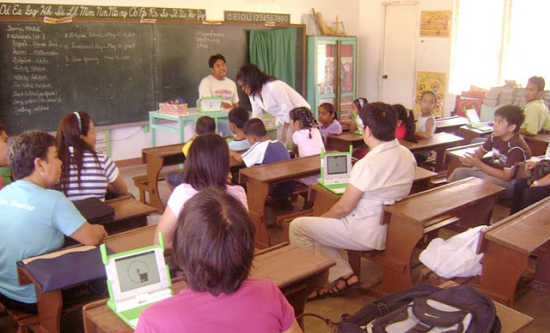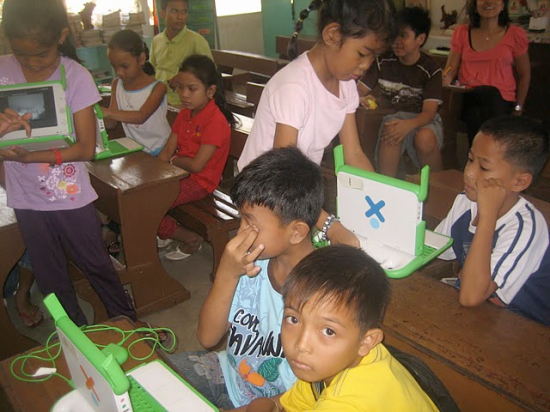eKindling is collaborating with OLPC Friends and OLPC-NZ (New Zealand) in bringing the first remote school Pilot in the Philippines. Recently they had a 5-day Teacher Training conducted by eKindling members Cherry Withers, Tessa Yuvienco and Hamilton Chua from Solution Grove.
The training included 3 teachers from Lubang Integrated School (LIS), 1 teacher from Maligaya Elementary School (a satellite school of LIS), Regional Department of Education superintendent, Principal of LIS, 4 incoming 4th graders and their parents, 4 Municipal employees of Lubang, and a handful of eKindling volunteers.

The training was in preparation for the September deployment of 100 laptops to both pilot schools. The purpose of the training is to get the community acquainted with the technology by going over the basics of the hardware and the Sugar operating system.
The training schedule/lesson outline was designed to introduce topics with increasing complexity as the days go by with Etoys and Moodle/XS introduced on the last two days of the 5-day training. It is completely flexible and adaptive to the teachers with their confidence in the use as eKindling's utmost priority.
Here's an excerpt from their Teacher Training Debrief Notes:
Vernacular is spectacular
Although the Philippines has myriad of dialects, English remains the nation's recommended second language. Math and Science are taught in English. The command of the English language was demonstrated by all participants during the introduction phase. They are all well versed in English. The instructors all emphasized in the beginning that they will answer and speak in both English and Tagalog. However, it was noticeable that the sole use of English during the first hour resulted in lack of questions and participation from the participants. The flow of communication improved after a switch to mostly Tagalog was done.
It wasn't long till the instructors started adopting the lessons to the local accent. Not only was communication much improved after this but it can be observed that participants are getting up from their seats and helping out others during the training.
By way of using the vernacular, participants were also relating the different views of Sugar to their own realities (ie, when lost go to home: "punta ka lang sa bahay" or to see your friends "mangapitbahay ka" Go to your neighborhood).
They're able to relate the different views to their own context.
Curiosity at play
Although it was repeatedly said that XO and Sugar are made specifically for children, the power of illustrating this can not be understated. An opportunity presented itself at the start of the second day. Two of the children were observed using the Chat activity.
In order for this to be accomplished, one had to figure out how to share the activity (a lesson that was going to be introduced that very day). The children however figured it out 10 minutes before instruction commenced. They were not staying in the same lodgings for the training and each of them did not have access to others after the training adjourns each day.

The instructor decided that it was a perfect way to introduce the lesson on Sharing an activity by having the children teach the class how they were able to run and play the Chat activity. Along with Speak this is one of the most favorite activities of the children.
This is OUR project
Ownership of the project from all participants is necessary for long term sustainability. It is eKindling's hope that identifying leaders within the pilot community and having them teach during the training will:
- Empower the community: That they themselves can rely on each other for support of this project.
- Create a sense of ownership:This is not just eKindling's project, it is OUR project.
Observations during break and lunch time yielded that Lloyd Daulat (municipal representative) was a great candidate to teach and address his own community. He taught the class XO's self diagnostics test and did it splendidly.
Champion Teachers
At first a couple of the teachers expressed their apprehension in learning the new technology and much more teaching it to their class. However, they all absorbed the material remarkably well to the point of blowing through two days worth of lessons in one day.
They were able to show their openness to the adoption of the technology during the demo-drill portion of the training where they were each given 10-15mins to demonstrate to a small group of children a short lecture incorporating the different activities.
This happened during the last day of our stay in Lubang. The teachers were able to come up with short lesson plans using Speak, Camera, Write, pre-made Etoys lesson, and Browse. Mrs. Sanchez, a math teacher, was able to come up with a lesson on Symmetry based on the preloaded pictures in Browse and having the children also take pictures of symmetrical and asymmetrical objects in the classroom.
A demo debrief and evaluation was given by Tessa at the end of the teachers' demo. This is to reinforce some key-points and set realistic expectations on what an actual implementation would look like.
The teachers expressed confidence that they will be able to integrate the activities in their lectures. Their main concerns are still classroom management and scheduling the use of the laptops among the three teachers in LIS but they are willing to try a few different things that our team and their group came up with during the brainstorming session.

